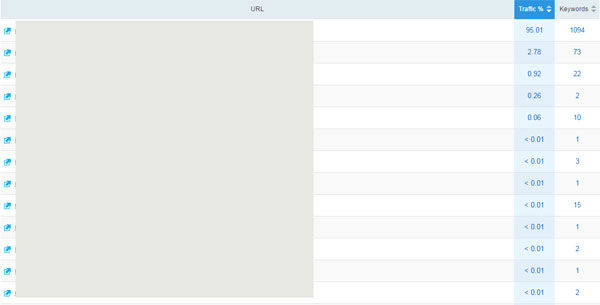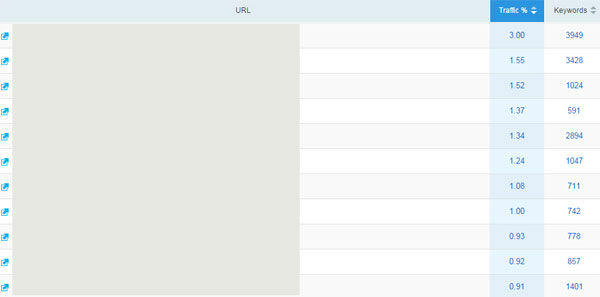How To Guarantee Quality Backlinks: The Best SEO Tool for Bloggers

Do you get a dozen emails each day pitching this link building service or that social media manager? What about freelance SEOs and content writers offering to provide you free quality content or links? In fact, I just got an email yesterday offering paid links on some of the most high-profile authority sites across a variety of niches. While I recommend bloggers earn their links by building relationships and credibility within their industry, these links would have been excellent additions to anyone’s backlink profile.
But what happens when you aren’t being pitched links on easily-recognizable, high-traffic authority websites? After all, hiring an SEO company or freelancer can make or break your business, so it is important you choose someone who isn’t going to get your website penalized and waste your money buying useless low-quality links. Whether you’re learning how to start a blog or managing the link building process for a large corporate website, here’s how to gauge whether a link is valuable or not.
 On the flip side, some of the domains you may consider reaching out to will have traffic trends similar to the chart below. If you don’t look at a website’s Google traffic and rankings, you may see a domain with high DA metrics, but in reality, the site is penalized. And needless to say, a site that is penalized isn’t worth your time.
On the flip side, some of the domains you may consider reaching out to will have traffic trends similar to the chart below. If you don’t look at a website’s Google traffic and rankings, you may see a domain with high DA metrics, but in reality, the site is penalized. And needless to say, a site that is penalized isn’t worth your time.
 Similarly, you may find sites with downward trajectories. Although they may not be penalized, a consistent decrease in rankings is an indication that Google is slowly devaluing the website’s content. You can still reach out as part of your campaign, but I would prioritize it for slow days or weeks when you don’t have high-value properties to approach.
Similarly, you may find sites with downward trajectories. Although they may not be penalized, a consistent decrease in rankings is an indication that Google is slowly devaluing the website’s content. You can still reach out as part of your campaign, but I would prioritize it for slow days or weeks when you don’t have high-value properties to approach.
 At the very least, these types of blogs aren’t penalized and have some SEO value. On the other hand, wouldn’t you rather be working with a website that has garnered enough Google Trust that every published post earns high enough rankings to contribute to the site’s overall traffic?
Ultimately, beyond just the immediate SEO value of link building on authority publications, you will enjoy increased exposure, new followers, and the potential for future bloggers to link to your blog, resources, and content via referral traffic.
An example of a blog with evenly distributed traffic sources can be found below.
At the very least, these types of blogs aren’t penalized and have some SEO value. On the other hand, wouldn’t you rather be working with a website that has garnered enough Google Trust that every published post earns high enough rankings to contribute to the site’s overall traffic?
Ultimately, beyond just the immediate SEO value of link building on authority publications, you will enjoy increased exposure, new followers, and the potential for future bloggers to link to your blog, resources, and content via referral traffic.
An example of a blog with evenly distributed traffic sources can be found below.
 This data can be found via SEMrush again. When perusing under the “Organic Research” section, click on the new “Pages” options and find a domain’s top performing content.
This data can be found via SEMrush again. When perusing under the “Organic Research” section, click on the new “Pages” options and find a domain’s top performing content.
The Problem with the Way Some SEO’s Value Domains
Since Google stopped updating PageRank (PR) a couple of years ago, the SEO industry has replaced PR with Domain Authority (DA) as the primary metric to gauge a website’s strength. Unfortunately, Moz’s DA metric has a few flaws. First, Moz isn’t Google or its subsidiary. The company and its developers have no inside knowledge of Google’s algorithm or the hundreds, if not thousands, of ranking signals. Second, the company does not have the resources or server strength to crawl and analyze the entire web. Remember, it takes Google days and weeks to sometimes run the algorithm that processes the Penguin and Panda updates. Then there is the issue of analyzing the SEO and backlink profile of every website, gauging the quality, and assigning a value. This is one of the biggest problems I’ve noticed with Moz. For example, I have a couple of test websites. They are tiny WordPress blogs with no real value to the world. The domains were never registered before so they started with a clean slate, and I’ve checked their backlink profiles on multiple occasions only to find a handful of “nofollow” links. Yet somehow, these domains have achieved a DA of 7 and 9. Finally, can we all agree that when Google algorithmically or manually penalizes a site and the domain loses all of its Google search engine traffic, the website effectively has no SEO value for your Google rankings? Moz’s DA does not have an indicator for this. You could be building links on a DA70 site that have absolutely no effect on your search engine rankings. The bottom line is that the Domain Authority metric is easily manipulated and offers inconsistent indications of link strength. If an SEO company is quoting you links based on DA, you’re likely to overpay for what you get.Evaluating Link Building and Guest Post Opportunities
The best and most direct way to gauge the value of a link from a specific domain is keyword rankings. If search engines respect a website and its content, they will rank their posts. Like any aspect of SEO, this approach is part art and science and requires some use of sound judgment. First, you will need a strong keyword rankings checker. I use SEMrush. Frankly, in my suite of SEO tools, SEMrush is the most powerful and important to me. Start by entering the domain of the link building opportunity you want to analyze. Now click to expand the “Organic Research” tab on the left and choose “Positions”. You will see a bar chart and with a line graph to the right. Opt to view the organic rankings over “All time”. Below is a snapshot of a website’s keyword rankings. Notice the gradual upward trajectory, demonstrating that the site has consistently earned more authority and rankings over time. However, the most important thing to pay attention to is that there haven’t been any significant dips in traffic, meaning no algorithm updates have affected this site. On the flip side, some of the domains you may consider reaching out to will have traffic trends similar to the chart below. If you don’t look at a website’s Google traffic and rankings, you may see a domain with high DA metrics, but in reality, the site is penalized. And needless to say, a site that is penalized isn’t worth your time.
On the flip side, some of the domains you may consider reaching out to will have traffic trends similar to the chart below. If you don’t look at a website’s Google traffic and rankings, you may see a domain with high DA metrics, but in reality, the site is penalized. And needless to say, a site that is penalized isn’t worth your time.
 Similarly, you may find sites with downward trajectories. Although they may not be penalized, a consistent decrease in rankings is an indication that Google is slowly devaluing the website’s content. You can still reach out as part of your campaign, but I would prioritize it for slow days or weeks when you don’t have high-value properties to approach.
Similarly, you may find sites with downward trajectories. Although they may not be penalized, a consistent decrease in rankings is an indication that Google is slowly devaluing the website’s content. You can still reach out as part of your campaign, but I would prioritize it for slow days or weeks when you don’t have high-value properties to approach.
Prioritizing Opportunities
Once you do find a domain with decent to strong traffic metrics, it is critical that you evaluate whether this domain authority extends to the entire site or merely a few pages. This analysis will determine how you prioritize this domain and how much effort you are willing to invest in building a relationship and earning a link. For example, some domains have one or two posts that account for a bulk of their traffic. You’ve noticed websites like that, right? Where Google falls in love with a particular page from that site and ranks it for every exact and partial match keyword while the other posts of the blog enjoy tiny traffic and rank for only a few exact match phrases. The chart below provides an example. At the very least, these types of blogs aren’t penalized and have some SEO value. On the other hand, wouldn’t you rather be working with a website that has garnered enough Google Trust that every published post earns high enough rankings to contribute to the site’s overall traffic?
Ultimately, beyond just the immediate SEO value of link building on authority publications, you will enjoy increased exposure, new followers, and the potential for future bloggers to link to your blog, resources, and content via referral traffic.
An example of a blog with evenly distributed traffic sources can be found below.
At the very least, these types of blogs aren’t penalized and have some SEO value. On the other hand, wouldn’t you rather be working with a website that has garnered enough Google Trust that every published post earns high enough rankings to contribute to the site’s overall traffic?
Ultimately, beyond just the immediate SEO value of link building on authority publications, you will enjoy increased exposure, new followers, and the potential for future bloggers to link to your blog, resources, and content via referral traffic.
An example of a blog with evenly distributed traffic sources can be found below.
 This data can be found via SEMrush again. When perusing under the “Organic Research” section, click on the new “Pages” options and find a domain’s top performing content.
This data can be found via SEMrush again. When perusing under the “Organic Research” section, click on the new “Pages” options and find a domain’s top performing content.

Great article! Do you think that SEO link tools will increase in importance in future?